 Petzlover
Petzlover Both Farm Cat and Maine Coon are originated from United States. Both Farm Cat and Maine Coon are having almost same weight. Farm Cat may live 5 years more than Maine Coon. Both Farm Cat and Maine Coon has same litter size. Both Farm Cat and Maine Coon requires Moderate Maintenance.
Both Farm Cat and Maine Coon are originated from United States. Both Farm Cat and Maine Coon are having almost same weight. Farm Cat may live 5 years more than Maine Coon. Both Farm Cat and Maine Coon has same litter size. Both Farm Cat and Maine Coon requires Moderate Maintenance.
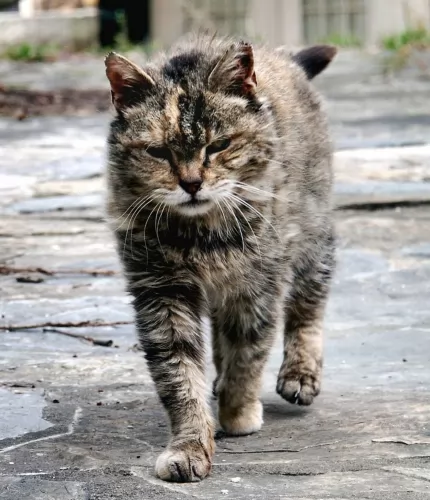 Known also as the Barn Cat, this domestic cat is of a mixed breed. The very name ‘farm cat’ is referring to a general kind of cat that lives in an almost wild state on farms and agricultural properties.
Known also as the Barn Cat, this domestic cat is of a mixed breed. The very name ‘farm cat’ is referring to a general kind of cat that lives in an almost wild state on farms and agricultural properties.
Possibly, their role in keeping rodents at bay was how they came about – domesticated to keep rodents away from grain crops.
When you do research you find that there is archeological evidence to suggests that these farm cats have been around since about 7500 BC. Most barn cats fall under the domestic shorthair or domestic longhair categories.
These cats live in a variety of conditions and some of them get their food solely from the rodents they catch. Others are tame with access to supplemental cat food as well as veterinary care.
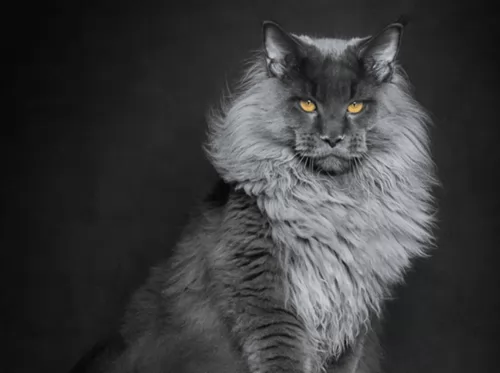 The Maine Coon cat hails from Maine, USA. It’s a natural cat breed with actually little being known of its exact origins.
The Maine Coon cat hails from Maine, USA. It’s a natural cat breed with actually little being known of its exact origins.
In fact, the first reference to the cat seems to have been in about 1861. It was in 1895 that a female Maine Coon was named Best Cat at a cat show held in Madison Square Gardens.
The Cat Fanciers Association was formed in 1908, and the 5th cat registered as a Maine Coon named Molly Bond.
The Maine Coon Breeders and Fanciers Association was formed in 1968. The cat is also the official state cat of Maine.
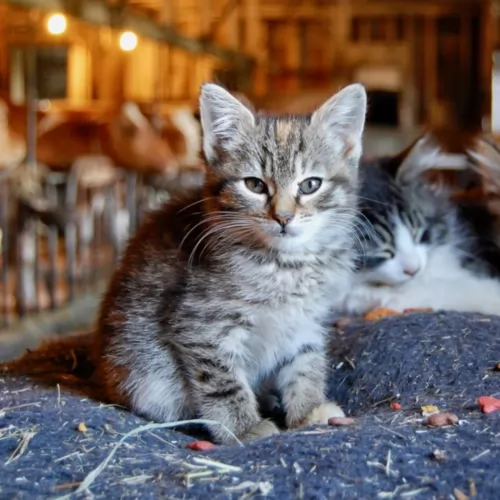 Farms cats are also members of domestic cats but it’s just that they are usually not socialized and they run away from people.
Farms cats are also members of domestic cats but it’s just that they are usually not socialized and they run away from people.
Farm cats have different histories and there is really no one-size-fits-all description of them.
They can weigh anything from 2 to 8kg. They can live to be anything between 10 and 20 years of age. Some of them are large, some small, some are solid colored while others are bi-colored and patterned. Their coats differ too and you can find short- and long-haired varieties among your farm cats
Their eyes and ears will also be in any shades and sizes and these cats are usually not spayed or neutered and can produce kittens that nobody is sure how they’ll turn out.
If you were to stumble across a farm cat born of unknown parents, there is no knowing what the small feline will behave like. Socialization and lifestyle play a big role in determining how a kitten will turn out but farm cats left to their own devices could be quiet, aggressive, loving, naughty, reticent, reserved, playful, lazy, shy or nervous.
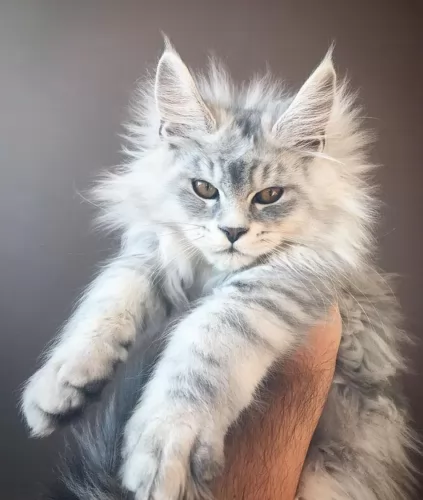 This is a large cat breed with strong bone structure. They can weigh between 5 and 9kg.
This is a large cat breed with strong bone structure. They can weigh between 5 and 9kg.
The height of these cats can be in the region of 25 and 41cm and they can reach a length of 97cm, including the tail. The body is muscular and robust with the chest being broad.
When it comes to the cat’s coat, the Maine Coon is characterized by the ruff along its chest. It has a 3-layered, water-resistant coat with longer hairs over a silky undercoat, and a long, bushy tail. The color of the coat can vary but the most common color is brown tabby. . It is medium- to long-haired. It’s a seasonal shedder with the fur being considerably thicker in the winter. All colors are available in this cat except blue.
The Maine Coon is a sociable cat and known for it playfulness as well as it being an intelligent cat and easy to train.
You’ll certainly need to supply the cat with some puzzle toys so as to stimulate his brain. It is also one of these cats known to have dog-like characteristics, becoming attached to its human owners, and being good-natured.
It is a loving cat and is also fairly vocal, wanting to tell its human owners what it wants. It’s not a lap cat. It is a gentle cat and gets on well with children and dogs as well as other cats.
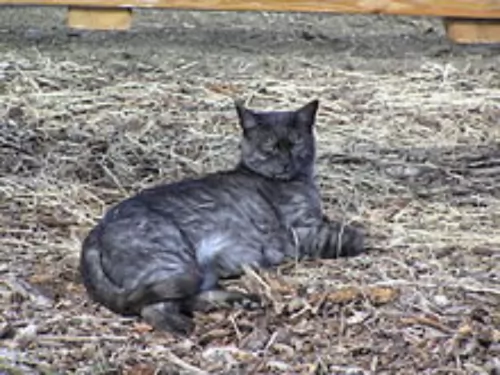 Farm cats are such wonderful animals – they just need a good chance in life like other domestic cats.
Farm cats are such wonderful animals – they just need a good chance in life like other domestic cats.
Many of them have had a hard life and it can be marvelous to open your home and heart to one or two of them and see the pleasure they bring.
They’re full of character and if you provide them with good food and a warm bed and promise to love them, you’ll no doubt be starting a solid and meaningful friendship that can enhance your life.
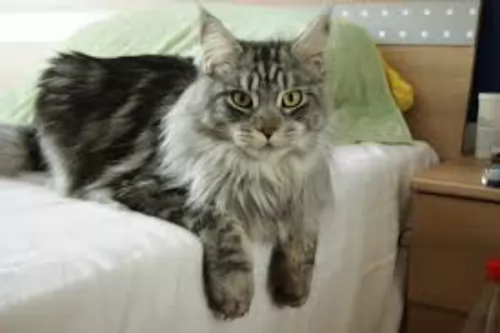 Maine Coon cats are such awesome pets and highly entertaining. They're excellent climbers too and to add to their many amazing characteristics, they love playing in water too.
Maine Coon cats are such awesome pets and highly entertaining. They're excellent climbers too and to add to their many amazing characteristics, they love playing in water too.
You’ll be doing him a favor by providing him with a paddling pool. They’re so clever, they may even learn to turn a tap on.
He is such a social, friendly, family-loving cat and it's not surprising that he’s a firm favorite with most cat lovers.
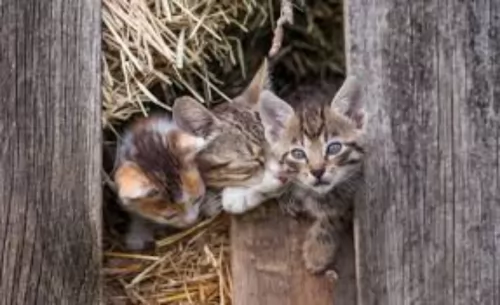 Farm cats left to fend for themselves can suffer from a host of illnesses. Eye infections are one. The cause of these eye infections is usually a virus, of which herpes, chlamydia, and Calicivirus are the most common.
Farm cats left to fend for themselves can suffer from a host of illnesses. Eye infections are one. The cause of these eye infections is usually a virus, of which herpes, chlamydia, and Calicivirus are the most common.
Your vet will certainly prescribe you some antibiotics for your kitten to help against secondary infections.
Check your farm kitten over as he is likely to have a nose full of snot as well and may even be sneezing. Take the kitten to the vet who can give him a good once-over and put him on the road to recovery.
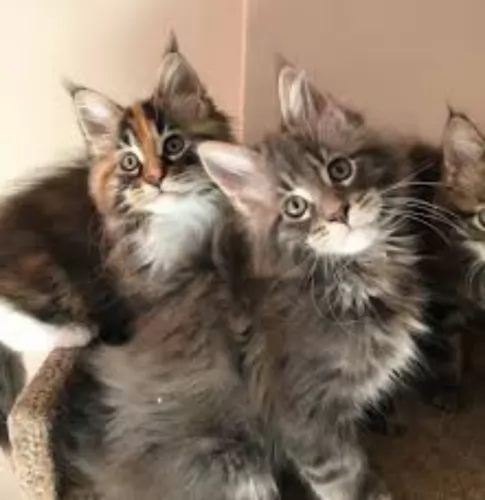 There are certain health problems that seem to occur in this particular cat breed, including hip dysplasia and feline hypertrophic cardiomyopathy.
There are certain health problems that seem to occur in this particular cat breed, including hip dysplasia and feline hypertrophic cardiomyopathy.
Hip dysplasia is a condition of the hip joint that can cause degeneration of the joints. It can lead to stiffness and pain for your cat and it can be that your cat develops osteoarthritis.
If your cat develops hip dysplasia it won’t want to jump, it becomes lethargic and there may even be muscle loss in the rear legs.
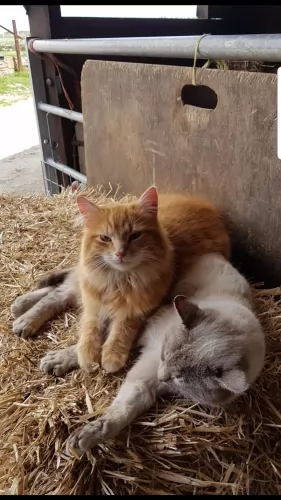 Barn cats or farm cats are not likely to have been neutered or spayed and they are just adding to the overpopulation of farm cats that can become feral cats.
Barn cats or farm cats are not likely to have been neutered or spayed and they are just adding to the overpopulation of farm cats that can become feral cats.
The average fertile cat can produce three litters every year, and with as many as 6 kittens in a litter, you can imagine how a small colony of cats can get out of control.
Sometimes cat rescue programs do a steri-drive and spay and neuter cats like this to curb the numbers. Of course, spaying and neutering can prevent many diseases as well.
If you have farm cats that have been spayed or neutered, provide them with good food and water. You can put out wet, canned cat food or dry kibble – they’ll be so pleased as most times these cats don’t even know where their next meal will come from.
You see them drinking out of puddles of water. Unfortunately, these pools are often filled with contaminants and this can also make the cats sick.
Every cat just wants a soft, warm place to sleep, and if you can, provide some warm dry hay for these farm cats. Even a cardboard box can be a haven for a cat that has never known a bed.
If you have managed to catch a farm cat kitten and you want to offer it a home, make sure to start off with veterinary care and vaccines.
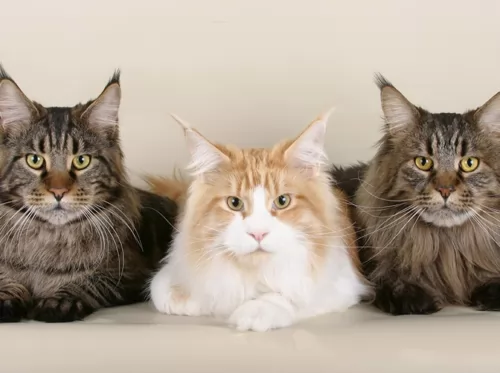 Cat owners need to realize that diet is one of the most important factors of keeping a cat healthy. The Maine Coon needs nutritious food.
Cat owners need to realize that diet is one of the most important factors of keeping a cat healthy. The Maine Coon needs nutritious food.
Some people give their cat a mix of dry kibble as well as wet food. It is better to feed your pet smaller meals as opposed to large meals. What is very important is that the cat food is of a high-quality and that it be made up of meaty protein as every cat is a carnivore.
Provide your Maine Coon with a litter box and put it in a quiet, private area. It’s a large cat so make sure the litter box is large as well. With a cat you may need to experiment with him to figure out where he prefers his litter box to be.
This is an active cat so ensure that he gets plenty of exercise. Provide him with climbing equipment and stimulating toys. Your Maine Coon might even enjoy going for a walk and for this, you’ll need to get a cat harness.
Every cat likes to scratch – it’s normal behavior. Make sure you have one or two scratching posts with heavy bases set up for your cat otherwise he may direct his scratching on your furniture.
Every cat owner needs to know a good vet in their area so that their pet can get immediate veterinary help when he becomes sick.
Your Maine Coon’s coat is thick – made up of 3 layers. To maintain its silky feel, and to prevent matting, make sure to brush it once or twice a week. Make it an enjoyable, gentle grooming session for your furry pet. Speak to your vet about the right kind of brushes.